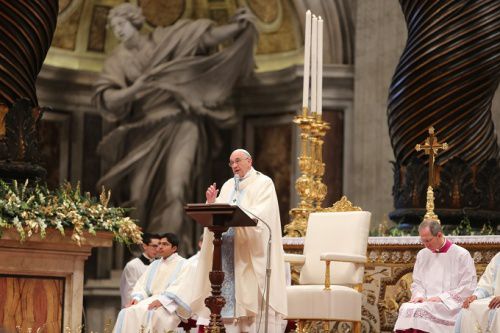The path Jesus takes as a humble servant isn’t easy, Pope Francis has said, explaining that to follow him doesn’t guarantee earthly success or honor, but rather true freedom and unity with God. “Following Jesus means taking up one's own cross to accompany him on his path, an uncomfortable path that is not one of success or earthly glory, but which leads to true freedom, the freedom from selfishness and sin,” the Pope said Sept. 13. It means clearly rejecting “that worldly mentality which puts the ‘I’ and one's own interests at the center of existence,” he said, adding that one must also be willing to lose one's own life “for Christ and the Gospel, in order to receive it, renewed and authentic.” Thanks to Jesus, he observed, we are certain that this road leads to the resurrection, and to a full and definitive life with God. Pope Francis spoke to the pilgrims gathered in St. Peter’s Square for his Sunday Angelus address, reflecting on the day’s Gospel reading from Mark. In the passage, taken from Chapter 8, Jesus asks his disciples who people say that he is, which is a question the Pope noted is “addressed directly to those who follow him, to test their faith.” After hearing them respond with a variety of answers such as the Prophet Elijah or John the Baptist, Jesus is struck by Peter’s faith when the disciple bluntly declares that he is the Messiah, Francis recalled. However, immediately after, when Jesus begins to tell of his coming Passion, death and resurrection, Peter is scandalized and takes Jesus aside to rebuke him. “And how does Jesus react? He reproaches Peter to his face, with very severe words: ‘Get behind me Satan!’” Francis said, noting that Jesus says this because Peter is thinking “not as God does, but as men do.” Jesus sees that in Peter, the grace of the God that allowed him to recognize Jesus as the Messiah “is opposed by the temptation of the Evil One, who wants to turn us away from the will of God,” the Pope said. Peter wasn’t the only one who faced this temptation, he said, explaining that it was also present inside the other disciples and is “in each one of us!” By announcing that he must suffer and die, Jesus is making it clear to his followers that he is a Messiah who is a humble servant, and who obeys his Father even to the point of dying on a cross, Francis said. The Pope then recounted how Jesus gathered the crowd along with his disciples, and told them that whoever wants to follow him must also become a servant, and “deny himself, take up his cross, and follow me.” To imitate Jesus in his servantly role and to follow him isn’t easy, Pope Francis observed, and requires a strong union with the Lord, an “attentive and diligent listening to his Word, (and) the grace of the sacraments.” He closed his address by praying that Mary, who accompanied her son to Calvary, would intercede in purifying our faith from false images of God, and helping us to adhere fully to Christ and the Gospel. After leading pilgrims in the traditional Marian prayer, Francis drew attention to the Beatification of Blessed Samuel Benedict Daswa, which took place yesterday in South Africa. Daswa, a husband and father, was killed in 1990 for denying witchcraft as the reason for heavy storms in his area. He refused to pay the fee demanded for the investigation to find the “witch” responsible, arguing that his Catholic faith prevented him from participating in activities related to witchcraft. Many in the village viewed his refusal as a belittlement of traditional beliefs, and a result he was stopped on the side of the road and killed by a mob while on his way home Feb. 2, after taking his sister-in-law and her sick child to the doctor. “In his life he always showed great consistency, courageously taking on Christian attitudes and refusing worldly and mundane habits,” Pope Francis said, explaining that his witness especially helps families “to spread the truth and charity of Christ.”

